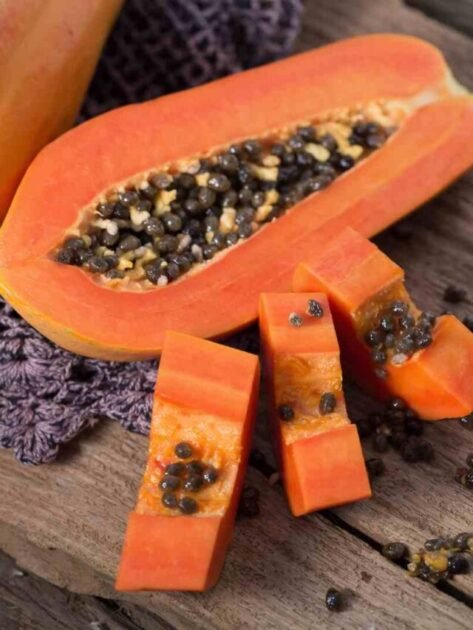Do you know how to Restore Skin Elasticity Naturally?? Elasticity in simple terms is skin’s ability to bounce back after it is being stretched. As your age increases, your skin starts to lose it natural plumpness due to decrease in the production of collagen and elastin, the two primary structural proteins that make skin elastic and firm.
What is elastin and collagen?
Table of Contents
Our skin contains the proteins elastin and collagen. Elastin is a protein that is about a thousand times more flexible than collagen and is responsible for your skin’s capacity to rebound. Collagen is a protein that forms and maintains your skin. Fine lines, wrinkles, saggy skin are signs of low levels of elastin and collagen in the skin. That is the most common problem in aged skin and that is the reason why people empty their pockets in salons for expensive treatments.
What causes loss in skin’s elasticity?
Elastosis is the term given to loss in skin’s elasticity. Some factors leading to elastosis are sun exposure, improper sleep and diet, Aging, Pollution, UV damage by sun and also smoking.
Does skin’s elasticity decrease with age?
As we know Collagen Benefits in Skin. However, Collagen levels in skin decreases with age. After the age of 20, you lose about 1% of your collagen production every year, and this loss increases dramatically after menopause. With that, as you age, there is less elastin in the skin, leading to wrinkled, sagging skin, says “Dr. Anil Ranjani, board-certified aesthetic doctor and founder of Style Aesthetics.
How to Restore Skin Elasticity Naturally?
As we age, our skin naturally loses its elasticity. This can lead to wrinkles and sagging, making us look older than we feel. However, there are many natural ways to help restore skin elasticity and keep our skin looking youthful and radiant.
One of the most important things we can do to improve our skin’s elasticity is to stay hydrated. Our skin is made up mostly of water, and when we don’t drink enough, our skin can become dehydrated, dry, and more prone to wrinkles. Aim for at least 8-10 cups of water per day to help keep your skin hydrated and plump.
Eating a diet rich in antioxidants, vitamins, and minerals is another way to increase skin elasticity. These vitamins and minerals can support formation of collagen, it is a protein that nourishes and gives structure to skin.
Berries, leafy greens vegetables, almonds, and fish are among the foods that are particularly good for the skin. Antioxidants included in berries can aid in fighting against free radicals, which can harm skin and create wrinkles.
Vitamins A and C are abundant in leafy greens vegetables such as spinach and kale, which may boost collagen formation. Nuts, including almonds and walnuts, are full of good fats that can keep the skin smooth and nourished. Additionally, fish like salmon are rich in omega-3 fatty acids.
10 ways to restore skin’s elasticity

1- Hyaluronic acid
One of the best ways to restore skin’s elasticity is to incorporate the use of hyaluronic acid in your skin care routine. Hyaluronic acid penetrates deep into the pores due to its low molecular weight and provides hydration to the skin. It is found naturally in the skin tissues but like collagen it also decreases with age. It is the key player in keeping skin moisturized and hydrated. Using serums or creams containing hyaluronic acid can improve skin’s elasticity. Always use it on the damp face before putting on your moisturizer.
2- Vitamin C
Vitamin C increases both hyaluronic acid and collagen production in the skin. So, a diet rich in vitamin C can work like a magic for your skin. Vitamin C prevents premature aging and restores a healthy, youthful skin. Use Vitamin C in your day time skin care routine and apply it as a second step after applying your hyaluronic acid serum.
3- SPF
Sunscreen is most important step of your morning skin care routine. UV rays from the skin can penetrate deep in to the skin and can damage the skin’s elastin. This can lead to fine lines, wrinkles and saggy skin. It protects elastic, collagen and hyaluronic acid in the skin from harmful UV rays and helps to restore skin’s elasticity.
4- Fish oils
Fish oils are scientifically proven in restoring skin’s elasticity and boosting collagen production. Fish contains Astaxanthin which is one of the most powerful anti-oxidants on earth and helps in collagen production,
5- Exfoliation
Exfoliation is necessary for the skin either once or twice a week depending on the skin type. It removes dead cells from the skin and regular exfoliating will increase strength and provide firmness to your skin. Removing dead cells will lead to the production of new healthy skin cells with a softer and lifted texture and more collagen. Moreover, your skincare products will also work better. Related: Skin Cycling – Viral 4 Day Skincare Trend
6- Witch-Hazel
It contains strong anti-oxidants which can fight free radical damage and also prevent elastin and collagen in the skin. Some people are sensitive to this Witch-Hazel but using it in a toner is a great idea.
7- Collagen Supplements
Collagen is one of the two main proteins that boosts elasticity. Current researches emphasizes on the oral administration of collagen supplements to get rid of fine lines , wrinkles and saggy skin. Not only your skin gets better but your nails and hair too. Collagen also improves joints and can relieve joint pains. Prefer collagen from cow, fish or chicken source.
8- Ginseng tea
Ginseng tea is one of the clinically proven teas in reducing wrinkles, signs of aging and in promoting elastin and collagen production. It is also a powerful antioxidant and rich in Vitamin P(flavonoids). These vitamins bring collagen and elastin to the skin while increasing blood circulation.
9- Face Massage
Anti-aging face massage is popular to plump the skin and make it look more lifted. Massage helps in improving blood flow and promote the efficient delivery of nutrients into the skin. Moisturizing face massage in your skin care regime can stimulate and contour your face muscles. Massage upwards starting from the neck and the direction should always be against the gravity.
10- Sleep
We cannot get enough of it right? Lack of sleep is one of the common causes of aging skin. Inconsistent sleep produces stress hormone called cortisol in your body and you know stress can destroy your skin’s quality. As you sleep, your body produces some hormones which are essential in the production of collagen and elastin in your skin. Therefore, we should also focus on our sleeping schedule.
Is diet important for skin’s elasticity?
Antioxidants including vitamin C, vitamin E, carotenoids, and lycopene found in plant foods can help keep skin supple and plump.
It’s important to keep in mind that even the healthiest diet cannot stop sun-induced ageing. Although consuming a diet rich in antioxidants or taking antioxidant supplements is an excellent way to start, they cannot substitute sun protection.
How do you know your skin has good elasticity?
Snap test can be used to examine skin’s elasticity. You just need to pinch your under-eye skin with your forefinger and thumb. If it rebounds quickly, it is an indication of good elasticity. If it takes a bit time to come back then you have less skin elasticity.
Some tips from the professional
Good thing is now with these tips from Dr. Anil Ranjani, we can follow his ways to restore skin’s elasticity without expensive procedures and treatment. Dr Anil Ranjani is my favorite aesthetic doctor when it comes to skincare tips. I always follow him and watch his videos because he explains everything easily and in no time. Here are some ways to restore skin’s elasticity explained by him.











